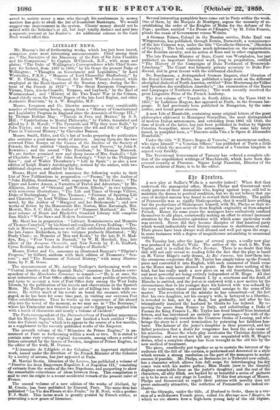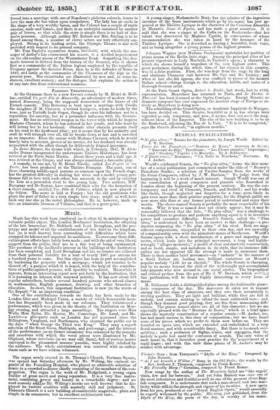4t 64ratrt5.
A new play at Sadler's Wells is a novelty-indeed! When first they undertook the managerial office, Messrs. Phelps- and Greenwood -were ready patrons of those dramatists who, hoping against hope, still toil to maintain the drama in poetical condition, but we do not believg that one case of decided success was found to reward their liberality. The public of Pentonsille was so rigidly Shakespearian, that it would have nothing but the productions of Shakespeare himself, with Mr. Phelps as their in- terpreter, and was just as averse from Falglish originality as from adapted French. Hence for some years the managers have exclusively confined themselves to old plays, occasionally making an effort to attract increased attention by the decorative splendour with which some particular work was revived. Never did they become disciples of that fanatical party which would indissolubly wed literary eminence to shabbiness of scene. Their pieces have been always well dressed and well put upon the stage ; in some instances with a degree of magnificence astonishing to occasional visitors.
On Tuesday last, after the lapse of several years, a really new play was produced at Sadler's Wells. The author of the work is Mr. Tom Taylor, and it is called the Fool's RecA:ge. There is-no doubt that this title will not only reveal to reading folks the fact that the play is based on M. Victor Hugo's early drama, Le BM s'amuse, but lurci-thera into the erroneous conjecture that Mr. Taylor has simply taken up the Freneh piece and converted it into English, with such command of blank verse as the Muses may have -pleased to .grant.-Be has done nothing of the kind, but has really made a new piece on an old foundation, his third and most powerful act being entirely independent of M. Hugo. All that relates to the-enticement of .Francis I. by a courtesan and the death of Blanche is omitted, and the jester-is endowed with a new motive by the circumstance that in his younger days his beloved wife was seduced by the very nobleman whose consort'he would consign to the arms of his master. The revelation of the mistake he has conunitted—of the fact that his own daughter, not his enemy's wife, is betrayed to a libertine, is revealed to him, not by a flash, but gradually, and after he has triumphantly insulted the husband he thinks he has injured. By re- moving the scene from France to Italy, and substituting a Duke of Faenza for Xing Francis I., Mr. Taylor has freed himself from historical fetters, and has introduced an entirely new personage—the wife of the Duke—who strongly resembles the-Countess Orsina of Leasing, and who 'brings the story tea novel termination .by poisoning her faithless hus- band. The honour ofthe jester's daughter is thus preserved, and her father perceives that a desire.for vengeance has been the sole cause of his miseries. Hence the whole play inculcates the Christian doctrine of forgiveness ; and we need not tell any one acquainted-with M. Hugo's drama, what a complete change has 'been wrought in'the old tale by the new method of treatment.
The piece, excellently put together so as-to sustain the interest of 'the audience till the fall of the curtain, is performed and decorated in a style which reveals a alanng resolution on the part of the managers to secure success if possible. Mr. Phelps, as Bertuccio (so is Triboulet now called), :has a character which allows him full scope for interchanging his dry comic vein with his native pathos ; Miss Heath (new to the theatre) displays remarkable force as the jester's daughter.; and the rest of the characters, all ably filled, are.backed by as beautiful a series of pictures as is to be seen on any stage in 'London. "If this first attempt of Messrs. 'Phelps and Greenwood to regale their patrons with novelty does not prove eminently attractive, the matheties of 'Pentonville are indeed ex- clusive.
At-the OlymPic, •wider• the title, A Husband.to Order, 'there is a ver- sion of.a well-known French piece called lin lifariageaous r Empire, in which we are .shown hown high-born young lady of the old regime,
forced into a marriage with one of Napoleon's plebeian colonels, learns to love the man she has taken upon compulsion. The lady has an uncle in the shape of a very worldly•baron, and the Colonel has a couple of rustic cousins, male and female, and there is an underplot sustained by another pair of lovers, so that while the:story is simple there is no lack of dra- matis personte. Although neither Mr. Robson nor Mrs. Stirling is to be found among them, a -number of clever actors are very effectively em- ployed. Strong in its leading artist, the Olympic Theatre is also well provided with respect to its general company.
Mr. Tom Taylor's equestrian drama, Garibaldi, with which the ma- nager of Astley's has commenced, his season, is a decided improvement on the oldroutine pieces of the Westminster Road. Something like dra- matic interest is derived from the history of the General, who is shown first as a commander of the 'Italian legions employed by the republic of Uruguay against the dictator Rivas, then he is the defender of Rome in 1849, and lastly as the commander of the Chasseurs of the Alps in the present year. 'His vicissitudes are illustrated by new and, in some in- stances, excellent scenery; and the dialogue that explains the action is at any rate free from conventional nonsense.



























 Previous page
Previous page